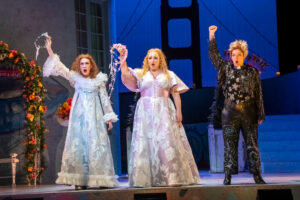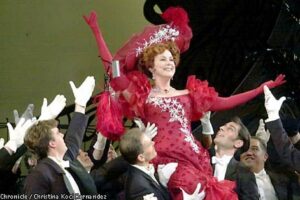
I tried so hard to like Elina Garanca’s Habanera
, an album of songs and arias about gypsies, but it was really difficult. I would’ve been able write this review earlier and quicker if I could just make myself like the album a lot, or even dislike it so that I could rail against the project and her. That didn’t even happen. I was just “meh” about it; nothing special except for the fashioney little booklet that came with it that made me feel like I was going to buy something from a catalog from some Vermont furniture store—and can we talk about that cover?
Garanca is lying down on a divan being all blonde and alluring, wearing what looks like a really expensive dress plus a necklace that perhaps says “I’m a gypsy who married into aristocracy.” I just don’t get it. Pictures of her in avant-garde hair styles? Pictures of carpets? Call me ignorant—and if I am I ask you to say it—but I thought the promotional material that came along with the CD was more of a “glamour” magazine than anything else.
Now for the really challenging task of trying to write about her music.
Let’s be straightforward here: I think Elina Garanca should not be touching these meaty mezzo roles at all. A Carmen she is not. Let’s repeat that: a Carmen she is not. The Seguidille in this recording was so painful to listen to I actually had to stop it several times as I felt I was being slowly murdered somehow. Let me share with you guys what I wrote down, as a stream of consciousness, while I was listening to it for the fourth time:
Very dark—the mood, on the verge of being homicidally slow without the verve and seduction that is usually associated with it. It’s just draggy, like “I’m gonna seduce you” and it takes a couple of hours and you’re just like “Ummm. I have to go” Is Carmen drunk or on drugs? I feel like the sound is being produced without something behind it, no umph, no point, or no enveloping sound.
Roberto Alagna‘s screeched out high note during the duet did not help—is that a wobble I hear? There’s no chemistry between these two. Perhaps Garanca is showing how bored Carmen was with Don Jose right from the very beginning and did not even bother to make her words sound believable… in that case, Don Jose is really fucking stupid.
The conductor, Karel Mark Chichon, who coaxed out beautiful singing in other parts, and the Orchestra Sinfonica Nazionale della RAI totally bombed on this one. It was torturous and I am left aghast that companies actually hire her for this role. The voice is neither cutting nor sensuous. It’s kind of just plain, I think. Dissenters welcome.
If this disc is any gauge of Garanca’s talents, they do not lie in the traditional repertoire at all. Certainly not the Carmen pieces. The two versions of the “Habanera” by Bizet, although musicologically interesting, was nothing spectacular vocally. “I Dreamt I Dwelt in Marble Halls” was very bland and staid, no longing or dreaming or fantasizing. It actually sounded whiny. I love that song, and maybe it is because Joan Sutherland’s version of it is still so fresh in my head that I cannot accommodate such banal singing of this piece.
I would have to say that the saving grace of this album is her Old Lady from Candide singing “I Am Easily Assimilated,” which I thought was fun and actually showed some personality. Was it her assumption of an exaggerated accent that made the aria work for her so well? Perhaps it was because, finally, there is something new and fresh coming out of this woman’s mouth, god bless her soul.
But when she turns to the Spanish works her real joy in singing shows through. She made me want to listen more to these works that I have never really even heard of before. She uses clean vocal runs for the pieces that have a fast tempo, and slows down with beautiful dynamics for those works that require softness.
In “Cuando está tan hondo” from El Barquillero by Ruperto Chapí, I thought Garanca was exciting, sensitive to the music and had some connection with the text. There is vocal support, joy, something visceral in the way she sings this romanza, which she lacks in the traditional repertoire. I am starting to wonder if she is completely bored with her current repertoire but feels like she has to sing them to remain viable.
In more eclectic, less “mainstream” works she also sounds more connected. The “Canción de cuna para dormir a un negrito” from “Cinco Canciones Negras” by Xavier Montsalvatge was quite heartfelt and moving in the simplicity of the musical line. It is actually interesting that when she does not sing in a traditionally operatic fashion she is able to play with the words and connect with the text more than she does with the canon works. “Canción del amor” by José María Gallardo del Rey was sung in a very relaxed and almost “alternative” manner. Her pronuniation of the Spanish z’s and c’s is quite spot on and I have to commend her for that. In fact, throughout the entire recording her diction is clean and crisp.
I think that the album concept brings about a question that we should all ask: why are opera houses not presenting Zarzuelas? I wonder if there are some classist implications and reasons to this. I find them thrilling and joyous. Lord knows we all need a revitalized repertoire so why not draw from this lovely musical tradition of a very fiery musical people? I invite the cognoscenti to educate me.
Buy this album for the Spanish stuff, I think they’re worth it. But for anything else besides that, I think we might just have to content ourselves with her live performances as they are probably better and have more of a holistic feel to them than this recording.



























Comments